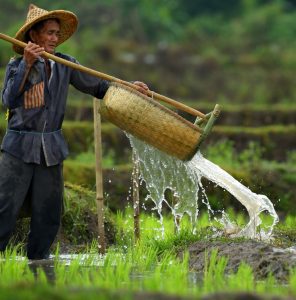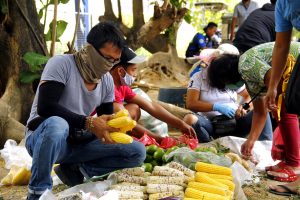Farmer Organizations and COVID-19 in ASEAN: Role, impact, and opportunities
Even prior to the pandemic, Farmer Organizations (FOs) in many ASEAN countries were playing an important role in disseminating information, reducing farmer risk and improving market reach. All of these have taken on a new significance in the post-COVID-19 world. Luckily, FOs were well suited to adapt to changing market conditions, stepping up their presence on social media and adopting vertical integration and in-house production processes to minimize supply chain disruptions and simultaneously ensure product quality and safety. Recognizing the importance of these organizations and working to strengthen and support their functioning should be a key priority for governments in the region, especially given the centrality of agriculture to these economies. – Kalyani Raghunathan, series co-editor and Research Fellow at IFPRI

Myanmar: Farmer watering the plants in the field Pre COVID-19. PC/ Shutterstock
Despite high economic growth, agriculture remains crucial for ASEAN countries, employing over 60% of the workforce in Laos and Myanmar. Even in countries where contribution of agriculture to GDP is low, it is amplified many-fold by the inclusion of agri-business. The orientation of agriculture is also fairly diverse, with some ASEAN countries focusing on export-oriented agriculture (palm oil and rubber in Indonesia and Malaysia, cacao, and coffee in Vietnam), while others like Laos and Myanmar have a greater focus on ensuring food security. Vietnam and Thailand are the second and third largest exporters of rice in the world, and ASEAN countries are also among the largest exporters of pineapple, bananas, coffee, cashew nuts, and fish and fishery products. Given the importance of agriculture, farmer collectivization through farmer organizations (FOs) could enhance farmers’ welfare by reducing transaction costs, bringing economies of scale, helping farmers realize better prices and reduce risk through product differentiation and marketing. This role is all the more important in these times, as FOs can significantly help in buffering against and recovering from the economic shocks that will follow the COVID-19 pandemic.
In several ASEAN countries, the system of agripreneurs is an important innovation which along with FOs has drawn young people into agri-entrepreneurship, bringing non-price attributes like value addition and food safety practices into focus (Table 1). Some farmer organizations and programs are using social media as an active platform for advertising, promoting, and selling their produce. In some countries, governments have rolled-out initiatives and are promoting start-ups for digitally linking farmers to investors and consumers. Such innovations have helped FOs in developing market and trade-focused skills, with farmers acquiring an entrepreneurial edge and experience in direct sales and food safety practices.
Table 1: Examples of various innovations undertaken by farmer organizations and programs in ASEAN countries
| Examples of FOs and programs in ASEAN countries | Fitness of FOs for COVID-19 response |
| Rakhawanna Yuwa Association, Myanmar | Provides training to young farmers on organic farming and permaculture |
| Farmer and Nature Net, Cambodia | Collaborates with FOs and cooperatives for food production, processing, storage, packaging and developing market-linkages |
| Farmer Basket Program (The Lao Farmer Network), Laos | Engages farmers in agricultural marketing using social media, promote and sell their organic produce |
| ‘Indonesian Farmers and Small Businesses Go Digital’, Indonesia | Promotes agri start-ups like iGrow, which is helping underemployed farmers get funding from various investors |
| Farmers Shops, Thailand | Deals in high quality processed products at a fair price, collaborates with private companies and the government to encourage members to produce quality fruits, particularly mangosteen |
| Sorosoro Ibaba Development Cooperative, Philippines | Ensures quality and safety of products by producing inputs, developing vertical integration & providing in-house services (e.g. artificial insemination) |
| Asian Farmers Association (AFA) for Sustainable Rural Development, multiple countries | Engages with FOs, like Hoi Vegetable Cooperative in Laos, on ground and conducts virtual sharing sessions on addressing challenges like supply-chain disruptions. |
COVID-19 and agri-food systems
Globally, agri-food systems are facing multiple challenges with COVID-19, calling for a more resilient agri-value chain, both domestically and internationally. According to experts, the lockdown and other restrictions to contain the pandemic have led to supply chain disruptions and shrinking demand for many agricultural products. These disruptions have not only affected farmers, but also other actors in the agri-value chain, including input suppliers, processors, agri-transporters, and extension officers.
In addition, COVID-19 is changing markets in a fundamental way by altering the shopping behavior of producers and consumers. Compared to pre-COVID-19 days, there is a greater push for innovations such as e-extension, e-trading and mobile payments. Further, there is likely to be a greater demand for food safety and innovations in delivery. Responding to this changing ecosystem requires public and private partnership. The good news is that many ASEAN governments are already looking for ways to address COVID-19 disruptions and engage with the changing systems.
Changing roles of farmer organizations post-COVID-19
Compared to India, the US and many European countries, ASEAN has been relatively unscathed by COVID-19 in terms of infection and fatality rates. Vietnam, one of the larger countries in ASEAN, is being recognized as a success story in containing the virus. Going forward, the demand for ASEAN food is likely to rebound faster than other countries. As countries look inward and weigh-in on local value chains, farmer organizations must adjust to the changing patterns in target markets. Digital transactions are likely to become more common, as are changing food habits. When consumers buy online, brand loyalty is harder to cultivate, and grading systems, certification, and quality control become more important. Digital advances also reduce entry barriers for small and micro food enterprises, thus opening new avenues for FOs. In Cambodia and Myanmar, there is a rapid move towards financial inclusion with e-wallets and e-commerce systems. FOs can benefit from changes in consumer behavior by meeting the demand for niche food industries and delivering on attributes like branding, packaging, convenience, and food safety.
Successes and challenges during the pandemic
There is a renewed focus among ASEAN countries on program and policy changes, including credit and other input programs. FOs can play an integral role in increasing farmers’ awareness of the schemes and helping them subscribe to the schemes. Organizations like Vietnam Farmers’ Union and Asian Farmers Association (ASA) are doing just that. Pambansang Kilusan Ng Mga Samahang Magsasaka in Philippines is building farmer organizations’ capacity in social media and other technological platforms to reach a wider farmer base and participate in influencing policy, especially at the time of the pandemic. Along with this, it continues to work with farmers in distributing seeds, value-addition, and marketing of agri-produce.
With many regions under lockdown, consumers are depending on home deliveries. This presents an opportunity for FOs to directly sell to consumers. Lessons can be taken from cooperatives like Kababaihang Dumagat ng Sierrra Madre, a women-led start-up in Rizal province of Philippines, which recently started purchasing vegetables, fruits, and other products from its members to directly sell to consumers in regions under lockdown. In Cambodia, the Government plans a new unified logo for all certified organic fruits, vegetables, and other items. This can help FOs boost local agricultural production and make products competitive, both locally and internationally in the post-COVID-19 age.
While there are several success stories, FOs in ASEAN have also faced challenges during the pandemic, especially in landlocked countries like Laos. Many FOs selling perishables like carrots, Chinese radish, and beetroot to markets in the capital city, Vientiane, were constrained because of lack of traders, vendors shutting their shops, and rising costs of transportation. In Cambodia, farmers continue to have limited knowledge in processing, packaging, and transportation. Hence, post-harvest losses remain a major concern in the region. Also, farmer Organizations have limited access to warehouses and rice mills for storage and marketing. In such a scenario, the need to invest in post-harvest practices like refrigeration, modified atmosphere packaging, fermentation, canning, and storage becomes crucial to increase the shelf life of the produce.
Way forward for ASEAN farmer organizations
The pandemic has underscored the importance of FOs in the food system. They have played a huge role in linking farmers to markets and reducing risk, and continue to do so. Urban-based FOs and cooperatives dealing in marketing and food deliveries have also proved beneficial for consumers and profitable for producers. Their pre-existing presence on and experience with social media has allowed them to reach farmers even in lockdown.
It is clear that FOs need to be strengthened and supported. This would require collaboration among different stakeholders, including the government, private sector, and development organizations. For instance, the ASEAN ‘Roadmap for Enhancing the Role of Agricultural Cooperatives in Agriculture Global Value Chains 2018-2025’ highlights the importance of strengthening institutional capacities and policy frameworks for FOs across the region. In addition, strengthening their operational and institutional capacity, forging new partnerships with other agencies and countries, and developing new business plans amid changing market conditions will go a long way in consolidating the beneficial impacts of FOs, both during and after the pandemic.
Ruchira Boss is Research Analyst with the CGIAR Research Program on Agriculture for Nutrition and Health (A4NH). Fabrizio Bresciani is Lead Regional Economist at International Fund for Agricultural Development (IFAD). Mamata Pradhan is Research Collaborator with IFPRI. Devesh Roy is Senior Research Fellow with A4NH. The analysis and opinions expressed in this piece are solely those of the authors.
New research from a Special Issue of Applied Economic Perspectives and Policy
The pandemic caused disruptions to both the supply of and demand for health services that persisted past the lifting of lockdown measures.
Public food transfer programs have traditionally been the most common social protection programs in Bangladesh


